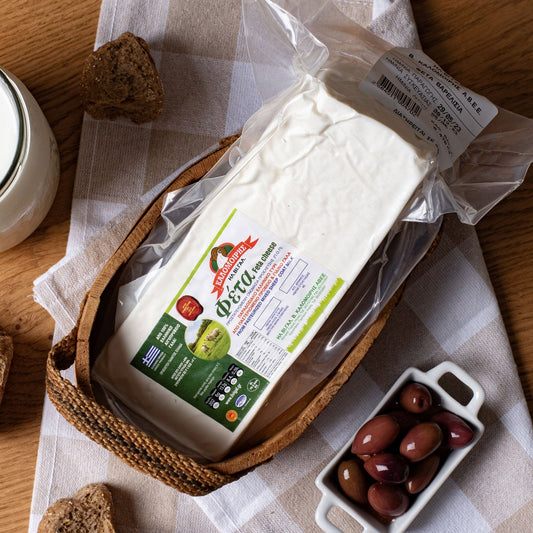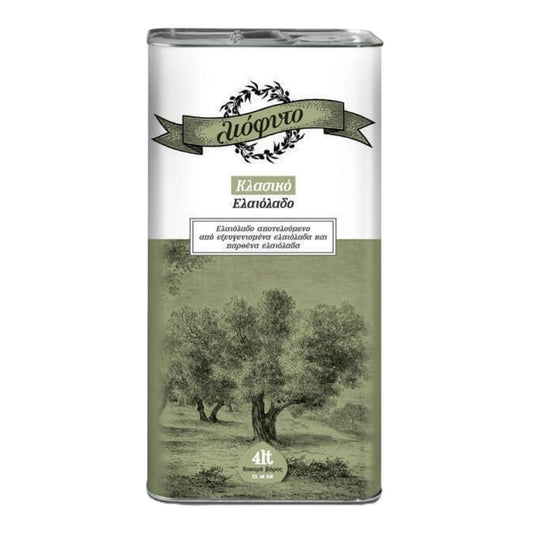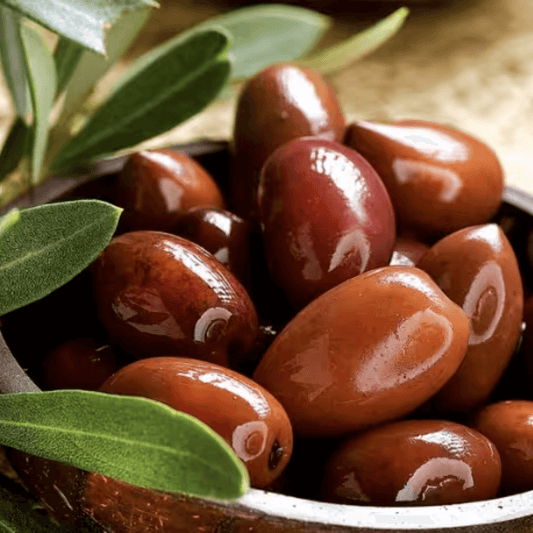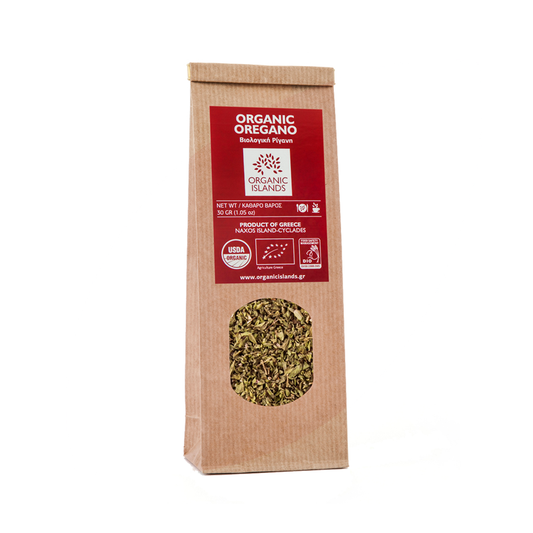As a Greek expat, I've always been passionate about the rich and flavorful cuisine of my homeland. Growing up, the aromas of freshly baked bread, simmering stews, and fragrant herbs would fill our home, transporting me to the sun-drenched streets of Greece. Now, as the owner of Greek Flavours, the largest Greek supermarket online, I'm on a mission to share the magic of Greek ingredients with home cooks around the world.
In this blog post, I'll introduce you to the essential Greek ingredients that every home cook should have in their pantry. Whether you're a seasoned Greek food enthusiast or just starting to explore the wonders of Mediterranean cuisine, these ingredients will become the building blocks of your culinary adventures.

Olive Oil: The Lifeblood of Greek Cooking
No discussion of Greek ingredients would be complete without mentioning olive oil. This liquid gold is the foundation of countless Greek dishes, from hearty stews to delicate salads. Greek olive oil is renowned for its rich, fruity flavor and high quality, thanks to the country's ideal growing conditions and centuries-old traditions.
When shopping for Greek olive oil, look for labels that specify the region of origin, such as Kalamata or Crete. These olive oils are often made from the Koroneiki olive, a small, hardy variety that thrives in the Greek climate. Drizzle it over grilled meats, use it to sauté vegetables, or simply dip fresh bread into it to experience the true essence of Greek cooking.

Feta: The Crumbly Cornerstone of Greek Salads
No Greek meal is complete without a generous helping of feta cheese. This iconic, crumbly white cheese is made from sheep's or goat's milk and is a staple in countless Greek dishes, from the classic Greek salad to savory pies and dips.
When selecting feta, look for blocks or wheels that are firm and creamy, with a slightly tangy flavor. Avoid pre-crumbled feta, as it can lose its texture and flavor. Instead, opt for a block of feta and crumble it yourself just before serving. This will ensure that the cheese retains its signature texture and pairs perfectly with juicy tomatoes, crisp cucumbers, and fragrant oregano.
Oregano: The Aromatic Backbone of Greek Cuisine
If there's one herb that defines Greek cooking, it's oregano. This fragrant, earthy herb is used liberally in a wide range of Greek dishes, from grilled meats and roasted vegetables to sauces and dips.
When shopping for Greek oregano, look for the dried, wild-grown variety, which has a more intense and complex flavor than the cultivated version. Rub the dried oregano between your palms to release its essential oils, and then sprinkle it generously over your dishes. The aroma alone will transport you to the sun-drenched Greek islands.

Lemon: The Bright, Tangy Accent to Greek Flavours
Lemons are an integral part of Greek cuisine, adding a bright, tangy accent to a wide range of dishes. From the classic lemon-garlic dressing for Greek salads to the tangy, lemony broth in avgolemono soup, this citrus fruit is a versatile ingredient that can elevate any dish.
When cooking with Greek lemons, be sure to use the zest as well as the juice. The fragrant oils in the peel can add an extra layer of flavor to your dishes. Experiment with lemon in marinades, dressings, and even desserts to experience the full range of its culinary potential.
Olives: The Salty, Briny Delight of the Mediterranean
No Greek pantry is complete without a selection of olives. From the iconic Kalamata olives to the smaller, more pungent Thassos variety, these salty, briny delights are a staple in Greek cuisine.
When purchasing olives, look for ones that are firm, plump, and free of blemishes. Avoid olives that have been sitting in water, as this can dilute their flavor. Instead, opt for olives that are packed in brine or olive oil, which will help preserve their texture and taste.
Spices: The Aromatic Accents of Greek Cooking
While Greek cuisine is often associated with simple, fresh ingredients, the use of spices is also an important aspect of the culinary tradition. From the warm, earthy notes of cinnamon to the bright, citrusy flavors of sumac, these aromatic accents can add depth and complexity to your dishes.
Some essential Greek spices to have on hand include:
- Cinnamon: Used in both sweet and savory dishes, cinnamon adds a warm, comforting flavor.
- Allspice: This fragrant spice, with its notes of clove, nutmeg, and cinnamon, is a key ingredient in many Greek stews and braises.
- Sumac: With its tangy, lemony flavor, sumac is a versatile spice that can be used to season meats, vegetables, and even salads.
- Cumin: This earthy, slightly smoky spice is a staple in Greek dishes like moussaka and dolmades (stuffed grape leaves).
Experiment with these spices, either individually or in combination, to create authentic Greek flavors in your home cooking.
Grains: The Hearty Foundations of Greek Meals
While Greek cuisine is often associated with its iconic dishes like moussaka and souvlaki, the country's culinary traditions also include a rich variety of grains. From the nutty, chewy texture of bulgur wheat to the fluffy, fragrant rice used in dolmades, these grains are the foundation of many Greek meals.
Some essential Greek grains to have on hand include:
- Bulgur Wheat: This partially pre-cooked wheat is a key ingredient in dishes like tabbouleh and pilaf.
- Orzo: These small, rice-shaped pasta pieces are often used in soups, salads, and casseroles.
- Farro: This ancient grain, with its nutty flavor and chewy texture, is a versatile ingredient in Greek cooking.
- Rice: From the short-grain Calasparra rice used in dolmades to the long-grain Basmati rice in pilafs, rice is a staple in Greek cuisine.
Incorporating these grains into your cooking can add heartiness and texture to your Greek-inspired dishes.

Conclusion
By stocking your pantry with these essential Greek ingredients, you'll be well on your way to unlocking the secrets of authentic Greek cooking. From the rich, fruity olive oil to the tangy, crumbly feta, these ingredients are the building blocks of a culinary tradition that has been honed and perfected over centuries.
As you explore these flavors and experiment with new recipes, remember to embrace the spirit of Greek hospitality and share your creations with family and friends. After all, the true joy of Greek cuisine lies in the communal experience of gathering around the table and savoring the flavors of the Mediterranean.
So, what are you waiting for? Start your Greek culinary adventure today!


















1 comment
Muchas felicidades! Me ha servido de mucho para comprar en una visita a Creta. La comida gruega es espectacular!! No la conocia tanto.